
PETROLOGY
Scope & Guideline
Unveiling Geological Mysteries Through Petrology
Introduction
Aims and Scopes
- Igneous Petrology:
Investigation of the origin, evolution, and crystallization processes of igneous rocks, including volcanic and plutonic formations. - Metamorphic Petrology:
Study of metamorphic processes, mineralogical transformations, and the conditions under which metamorphic rocks form. - Geochemical Analysis:
Application of geochemical techniques to understand the composition of rocks, fluids, and minerals, along with their implications for geodynamic processes. - Experimental Petrology:
Conducting laboratory experiments to simulate geological processes and to better understand the behavior of minerals and melts under varying conditions. - Tectonics and Geodynamics:
Exploration of the relationship between petrology and tectonic settings, including subduction zones, continental collisions, and rift environments. - Isotope Geochemistry:
Utilization of isotopic systems to trace the origins and evolution of rocks, providing insights into the processes of crustal formation and evolution.
Trending and Emerging
- High-Pressure Metamorphism:
An increasing number of studies focus on high-pressure metamorphic processes, particularly in subduction zones, indicating a growing interest in understanding the conditions that lead to the formation of eclogites and other high-pressure minerals. - Fluid-Rock Interaction:
Research on how fluids interact with rocks during metamorphism and magmatism is gaining traction, reflecting a shift towards understanding the role of fluids in geological processes. - Geochemical Modeling:
The use of advanced geochemical modeling techniques to simulate petrological processes is on the rise, indicating a trend towards integrating theoretical approaches with experimental data. - Experimental Studies of Magmatic Processes:
There is a notable increase in experimental studies aimed at understanding crystallization and differentiation processes in magmas, reflecting advancements in technology and methodology. - Mineral Stability and Phase Relations:
Research on the stability of minerals under varying conditions and their implications for understanding geological history is becoming more prominent, with an emphasis on thermodynamic modeling.
Declining or Waning
- Sedimentary Petrology:
Although sedimentary processes are fundamental to geology, there has been a noticeable decrease in studies focusing explicitly on sedimentary rocks compared to igneous and metamorphic rocks. - Metallogeny Studies:
Research on the petrology of ore deposits and their formation mechanisms has decreased, possibly due to a shift towards broader geochemical and isotopic analyses. - Paleontological Correlations:
The integration of paleontological data with petrological studies has waned, indicating a growing emphasis on pure petrological research without broader ecological contexts.
Similar Journals
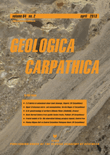
GEOLOGICA CARPATHICA
Fostering Innovation in Geological ResearchGEOLOGICA CARPATHICA, with ISSN 1335-0552 and E-ISSN 1336-8052, is a distinguished open access journal published by the Slovak Academy of Sciences Geological Institute, serving as a pivotal platform for the dissemination of research in the field of Geology. Established in 1991 and continuing through 2024, the journal is recognized for its significant contributions to Earth and Planetary Sciences, evidenced by its 2023 Scopus ranking placing it in the second quartile (Q2) within Geology. With an H-index that showcases its impactful publications, GEOLOGICA CARPATHICA is committed to fostering scholarly communication while promoting accessible research, having adopted an open access model since 2009. Located in beautiful Bratislava, Slovakia, this journal aims to engage a global audience of researchers, professionals, and students interested in ecological, geological, and environmental studies, making it a prominent resource for enriching the scientific community's understanding of the Carpathian region and beyond.
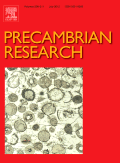
PRECAMBRIAN RESEARCH
Charting the Course of Geological Evolution Since 1974PRECAMBRIAN RESEARCH is a leading peer-reviewed journal published by Elsevier, dedicated to advancing the field of Earth sciences, with a specific focus on the study of the Precambrian era. With its distinguished Q1 ranking in both Geochemistry and Petrology and Geology, this journal plays a critical role in disseminating high-impact research, thus contributing to its impressive standing, ranked in the top percentages in Scopus for related fields. Founded in 1974, the journal has evolved continually, ensuring comprehensive coverage of geological aspects spanning from geochemical processes to petrological studies. Researchers and students alike will find this journal indispensable for accessing cutting-edge findings, methodologies, and innovative perspectives essential for understanding the Earth’s formative years. Although it does not provide an open-access option, its subscription provides a gateway to a wealth of knowledge and groundbreaking research pivotal for scholarly advancements leading up to 2024.

AMERICAN MINERALOGIST
Transforming Insights into Mineralogy and GeochemistryAMERICAN MINERALOGIST, published by the Mineralogical Society of America, stands as a premier journal in the fields of geochemistry and petrology, as well as geophysics, characterized by its prestigious Q1 ranking in both disciplines in 2023. As a vital resource for researchers, professionals, and students, the journal presents cutting-edge research, comprehensive reviews, and innovative methodologies in mineralogy and allied earth sciences. With converged publication years extending from 1968 to the present, it highlights significant advancements and breakthroughs within the realm of mineralogy. The journal's rigorous peer-review process ensures high-quality content that is both informative and impactful, making it essential reading for anyone engaged in earth sciences. Though it does not offer open access, the journal remains widely accessible through academic libraries, providing users with a wealth of knowledge to advance their understanding of mineralogical sciences.

Solid Earth Sciences
Illuminating the subsurface: where science meets discovery.Solid Earth Sciences is a dynamic open-access journal published by Elsevier, dedicated to advancing our understanding of the Earth's subsurface processes and materials. Since its inception in 2016, the journal has established itself as a vital resource for researchers and professionals in the fields of geochemistry, petrology, geology, geophysics, and geotechnical engineering, achieving a notable Q2 ranking in multiple categories as of 2023. With an ISSN of 2451-912X, the journal aims to disseminate high-quality research that enhances knowledge of earth surface processes and the intricate interactions within our planet's systems. The journal is indexed in Scopus, showcasing an impressive rank in various sub-disciplines, with a rank of #96 in Geology and a noteworthy percentile in Earth and Planetary Sciences. Solid Earth Sciences offers a platform for innovative studies, comprehensive methodologies, and cutting-edge technological advancements that cater to a global audience of scientists, academics, and students. With its commitment to open access, it fosters wider dissemination and impact of research outcomes, ensuring that pivotal discoveries reach stakeholders and contribute to real-world applications.

MINERALOGY AND PETROLOGY
Pioneering Research in Earth SciencesMINERALOGY AND PETROLOGY, published by Springer Wien, is a premier academic journal that has been contributing to the fields of geochemistry, petrology, and geophysics since its inception in 1987. With an ISSN of 0930-0708 and an E-ISSN of 1438-1168, this journal is recognized for its rigorous peer-reviewed articles that advance the understanding of mineral and rock formation processes, their physical and chemical properties, and the implications for broader Earth sciences. Holding a respectable impact factor and categorized in the Q2 quartile for both Geochemistry and Petrology, as well as Geophysics, MINERALOGY AND PETROLOGY ranks favorably among its peers, placing it within the top 50% of scholarly publications in these fields. Researchers, professionals, and students alike will find a wealth of knowledge in its pages, as it serves as a valuable resource for those aiming to explore the complexities of Earth's materials and compositions. Although it does not offer an Open Access option, the journal assures high-quality, impactful research that is crucial for ongoing advancements in Earth sciences.
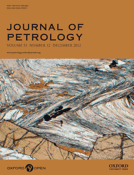
JOURNAL OF PETROLOGY
Exploring the Depths of Geochemistry and PetrologyJOURNAL OF PETROLOGY is a prestigious academic journal published by Oxford University Press, dedicated to the fields of geochemistry, petrology, and geophysics. Established in 1960, it has garnered significant recognition within the scientific community, currently holding an impressive Q1 ranking in both Geochemistry and Petrology as well as Geophysics, as of 2023. The journal is indexed in Scopus, ranking 20th out of 165 in Geophysics and 31st out of 154 in Geochemistry and Petrology, reflecting its high impact and contribution to Earth and Planetary Sciences. Designed for researchers, professionals, and students, the journal publishes cutting-edge research and reviews that advance our understanding of igneous and metamorphic processes, mineralogy, and the Earth's structure. With a commitment to rigor and scientific excellence, JOURNAL OF PETROLOGY serves as a vital resource for developing new concepts and methodologies in the study of Earth’s materials and processes.
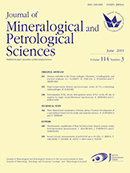
Journal of Mineralogical and Petrological Sciences
Exploring the Depths of Earth’s TreasuresThe Journal of Mineralogical and Petrological Sciences, published by the Japan Association of Mineralogical Sciences, serves as a vital platform for disseminating high-quality research in the fields of mineralogy and petrology. With a presence in both traditional and digital formats (ISSN: 1345-6296; E-ISSN: 1349-3825), this journal fosters scholarly engagement and innovation within these crucial branches of Earth Sciences. As evidenced by its Q3 ranking in both Geology and Geophysics categories for 2023, Journal of Mineralogical and Petrological Sciences maintains a significant standing within the academic community, contributing to the ongoing discourse and exploration of mineralogical phenomena and processes. Researchers, professionals, and students alike will find valuable insights and advancements represented within its pages, with a commitment to inclusivity in research output spanning two decades (2000-2024). Although not currently open access, the journal remains a key resource for understanding the complexities of our geological world.
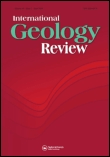
INTERNATIONAL GEOLOGY REVIEW
Exploring Earth's mysteries through rigorous research.INTERNATIONAL GEOLOGY REVIEW, published by Taylor & Francis Inc, is a premier journal dedicated to advancing the field of geology since its inception in 1959. With its Q1 ranking in the field of Geology for 2023, this journal is a significant platform for researchers, professionals, and students exploring the intricacies of Earth and planetary sciences. The journal has been rated in the 81st percentile within Scopus rankings, reflecting its influence and the high quality of articles published. Although it does not offer Open Access options, the journal maintains a rigorous peer-review process to ensure the publication of original and impactful research. With an extensive archive projected to continue until 2024, INTERNATIONAL GEOLOGY REVIEW serves as an essential resource for those seeking to deepen their understanding of geological phenomena, making it a vital contributor to the global scientific community.
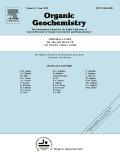
ORGANIC GEOCHEMISTRY
Exploring the Depths of Organic InteractionsORGANIC GEOCHEMISTRY, published by PERGAMON-ELSEVIER SCIENCE LTD, is a pivotal journal in the field of geochemistry and petrology, dedicated to the exploration of organic compounds and their interactions within geological systems. Established in 1977, this journal has been an influential medium for researchers, providing significant insights and advancements that have shaped the understanding of organic geochemistry. With an impressive impact factor and a distinguished ranking of Q2 in its category, it sits at the forefront of academic research, currently holding the 46th position out of 154 in Earth and Planetary Sciences according to Scopus, which places it within the top 70th percentile. Although it operates on a subscription basis, ORGANIC GEOCHEMISTRY is recognized for its rigorous peer-review process, ensuring that only the highest quality research is published. Its scope includes an array of critical topics, appealing to geochemists, petrologists, students, and professionals looking to deepen their knowledge and contribute to this dynamic field. With converged publications extending into 2024, the journal continues to play a crucial role in the dissemination of cutting-edge research that addresses global challenges such as environmental change and resource management.
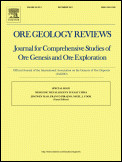
ORE GEOLOGY REVIEWS
Shaping the Future of Geological SciencesORE GEOLOGY REVIEWS is a premier academic journal published by Elsevier, renowned for its influential contributions to the fields of Economic Geology, Geochemistry, and Petrology, and Geology. With its esteemed Q1 ranking across these disciplines in 2023, it occupies a leading position in shaping scholarly discussions and advancements within the geological sciences. With an impressive Scopus ranking—47th in Earth and Planetary Sciences for Geology, and among the top 40 in Geochemistry and Petrology—this journal serves as an essential resource for researchers, professionals, and students committed to advancing knowledge in ore geology. Having transitioned to an Open Access model in 2022, ORE GEOLOGY REVIEWS enhances the accessibility of high-quality research, promoting wider dissemination and engagement with cutting-edge findings from 1986 to 2024. As a valued publication addressing the intricacies of ore deposits and geochemical processes, it aims to foster interdisciplinary collaboration and innovation in the field.